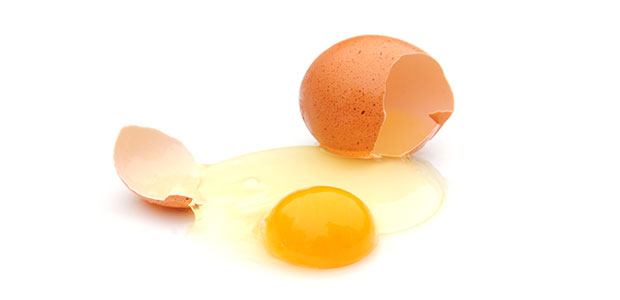Advertisement
Nutritional Value of Healthy Eggs
Eggs have been condemned, their high lecithin and methionine content ignored, yet lecithin is an essential part of our diet. It emulsifies fat, breaking it down to smaller fat droplets. This action speeds up and improves the digestion of fats by enzymes because the surface area is increased. Lecithin aids liver function, keeps the arterial … Continued

Eggs have been condemned, their high lecithin and methionine content ignored, yet lecithin is an essential part of our diet. It emulsifies fat, breaking it down to smaller fat droplets. This action speeds up and improves the digestion of fats by enzymes because the surface area is increased. Lecithin aids liver function, keeps the arterial lining free from cholesterol and prevents kidney and gallstones from forming. Methionine is also essential in the formation of nucleic acid of the genetic material of every cell. It’s a powerful antioxidant, assists in gall-bladder function and detoxifies heavy metals and excess histamine levels from the body.
The egg is more than nature’s most perfect food. It’s also nature’s most perfect creation. How can healthy eggs contain anything not wholesome and beneficial to humans? The contents in an egg depend on what was in the chicken that laid it!
The nutritional content of eggs can vary considerably with the source and time spent in storage. Nutritional authors advise us to avoid the mass-produced industrial standard eggs from caged hens. These may contain unwanted antibiotics and growth stimulants and viral infections as well as chemical contaminants from their food. Find and eat only farm fresh free-range chicken eggs, they say. But that is not always possible. Another alternative is to purchase premium-priced eggs produced and promoted as high-quality eggs such as “omega-3 eggs.” But should we eat eggs at all, and if so, how many per week?
If we go back in time about 35 years to Adelle Davis’s Let’s Get Well, we find eggs are highly recommended for their nutritional value and high lecithin content. She then goes on to describe the benefit of eggs in the diet of people with diabetes, heart disease, multiple sclerosis, psoriasis and weight problems. (These are some of our most common diseases and millions of dollars are spent on drugs to alleviate the conditions.)
Then 12 years ago, Drs Eberhard and Kronhaussen told us, in no uncertain terms, not to eat eggs.
“Egg yolks have too much cholesterol in them, 250 mg per yolk your total daily allowance,” they warned.
And more recently, in author Sally Fallon’s 1999 book Nourishing Traditions, we are advised to eat eggs often. Sally even tells her readers to give infants an egg yolk per day starting at age four months. Egg yolk supplies the cholesterol needed for mental development, sulfur containing amino acids and long chain fatty acids essential for brain development.
High quality eggs are rich in vitamins A and D, as well as choline for mental acuity in adults. Like the B vitamins, choline is a coenzyme needed for metabolism. Choline exists in all living cells, but is probably best known as a major part of lecithin–the emulsifier that keeps fats and cholesterol from clumping together in the blood.
Cholesterol And Protein
Research shows that humans do not increase blood cholesterol levels by eating cholesterol. Rather, we increase cholesterol by eating refined processed flour, sugars and fats. Based on these findings, we should eat eggs to help reduce cholesterol because of the lecithin content and avoid the processed and dead foods that are the real cause of cholesterol.
We all need protein, but it’s not only the amount of protein that counts, it’s the variety or number of different amino acids that can be found in the proteins. There are 20 amino acids with eight of them considered essential in the diet because our bodies cannot make them. Eggs are one of the few foods containing all the essential amino acids. With these, our bodies can make whatever non-essential proteins they need.
Eggs also contain carbohydrates, vitamins and minerals. Poached or soft-boiled eggs are best. Avoid hard-boiled eggs where the blue-green sulphur has separated from the yolk.
Recognize Healthy Eggs
High quality eggs have hard shells, a deep yellow-orange yolk that stands up in a round hemisphere and a white with a more viscous part surrounding the yolk and thinner area around the perimeter. As for viral and parasitic infections such as salmonella, if you purchase high quality eggs you shouldn’t have a problem. Parasitic eggs come from parasitized chickens which have been fed with animal protein and fish scraps. The eggs will have flat, pale yellow yolks, thin shells and a bland taste.
Most cities have egg wholesalers that receive eggs from a variety of nearby producers and distribute them to chain stores. They can never be sure of the quality and they cannot test all of them. To be on the safe side you must learn how to recognize the quality of eggs by their appearance after you break them. If making an omelette, break each egg into a saucer for inspection to avoid contaminating other eggs. If in doubt, discard eggs of doubtful quality or cook them hard enough to kill any parasites.
You may find it difficult or costly to obtain farm fresh eggs, but when you compare the nutritional value of eggs to any other whole food, healthy eggs are your best buy. You pay now or pay later!




